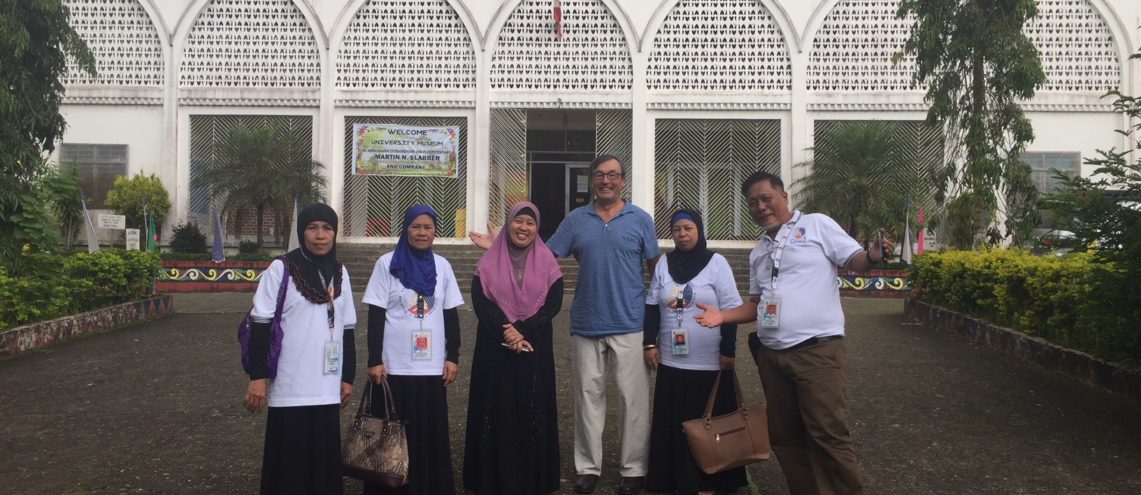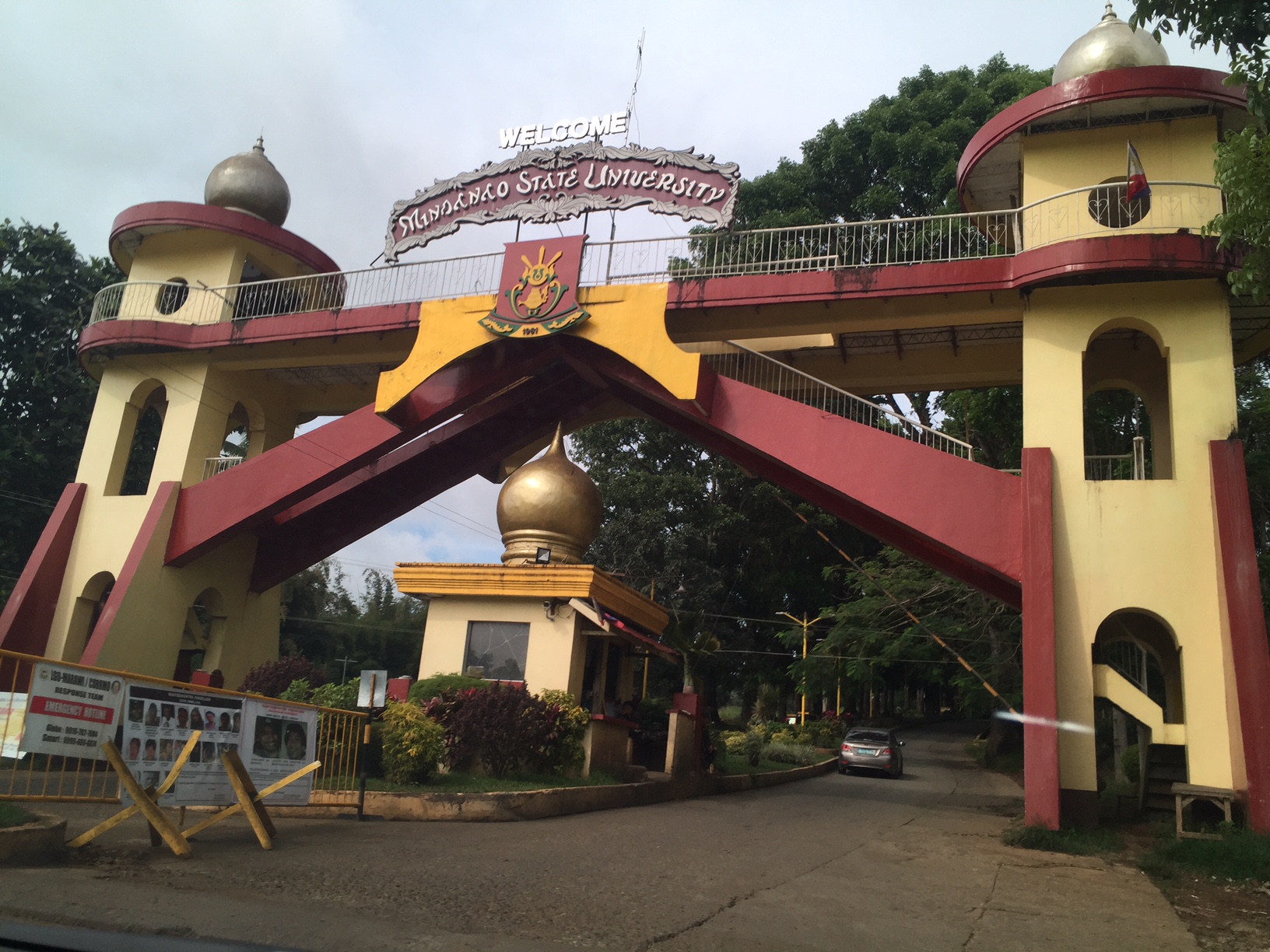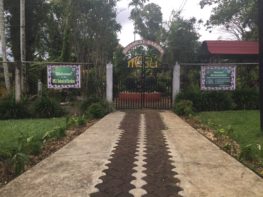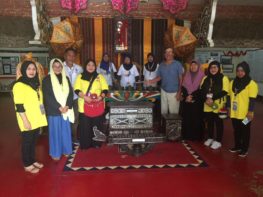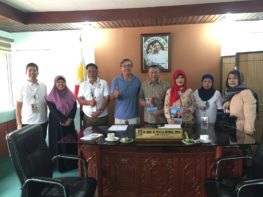VIA Experience
How did you first become involved with VIA?
I became aware of VIA when Dwight Clark visited Grove House during my sophomore year. I was interested in international issues because of my past (born in Prague, Czech mother, Finnish father, emigrated to the US at age 7). Vietnam was on everyone’s mind. I wanted to have a first-hand experience with Asia.
What inspired or convinced you to apply to be a volunteer?
In the spring of my senior year the only thing I knew for sure was that I did not want to continue as a full time student. (I had been accepted at Georgetown law school but had little desire to go.) One day I ran into Dwight, who was biking across campus, and he mentioned there was an opening for a two-year teaching job at Mindanao State University (MSU) in Marawi City, in the Philippines, for someone with a social sciences background. I was about to graduate with a degree in anthropology and considered this to be a chance to do “field work” and see Asia without a gun in my hand, an opportunity Vietnam was providing to many at the time. The timing was perfect! The application process had long been completed, and had it not been for a vacancy created by someone else’s change of plans and my chance meeting with Dwight, my life would have taken a different direction.
Could you tell us a bit about your experience as a volunteer?
I found myself teaching an array of courses needing a “fill-in”, including geography of the world (to students living on an island, many of whom had never seen the sea, because of a fear, on the part of the Muslims, of going to Christian coastal cities) and the history of China (having taken a course on modern Chinese history, and an anthropology course on the Chinese family at Stanford, and buying some of Mao’s Red Books in Hong Kong on my way to the Philippines), in addition to anthropology and sociology courses, for which I had more background.
Martial law was declared by Marcos 18 months into my 2-year assignment, closing MSU. The stated reason for the declaration of martial law was the threat of a “Maoist rebellion”, inspiring me to bury the Red Books students were reading in my class in the compost pit behind my cottage.
It was time to go home for another reason. I had contracted hepatitis from an infected needle in the MSU health center when getting a booster shot meant to keep me healthy.
I befriended Abdullah Madale, the man whose job it was to visit the “feeder” high schools providing Christian students with scholarships, incentivizing them to attend MSU, located in the “dangerous Muslim-dominated hills surrounding Lake Lanao”. (MSU was then ten years old, having been established as a place Muslims and Christians could study and live together.) Mr. Madale invited me to join him on many overland trips to remote regions of Mindanao, described in “Bannana’s Near Death Experiences”. MSU is today credited for the pioneering work it has done in bringing these historically adversarial communities together. I was told during my recent visit to MSU that many Muslim Maranao resisted the efforts of “outsiders” to radicalize them. The rebuilding of Marawi, now that the military operation to defeat the terrorists has been completed, may set an example of peaceful co-existence the world is in need of seeing.
Another highlight of my stay was a summer trip, by “smuggling boat”, from the Sulu Islands to Borneo (in Malaysia) and my safe return to the Philippines, via Palawan, a trip impossible for any outsider to make these days because of the threat of Somalian-pirate inspired kidnappings taking place there. (The kidnappings are not ideologically inspired but are seen, rather, as alternatives to fishing as generators of revenue.) My recent visits to MSU and Zamboanga, gateway to the Sulus, are described in my recently completed “Bannana Returns to Mindanao”. I was told it will be safe for me to return to Tawi-Tawi, in the Sulus, by plane, if accompanied by locals, a trip I intend to make when I return to the Philippines in May.
How did your experience change your perspective as well as influence your professional goals?
It was a fantastic learning experience in many ways. I got to see Asia from the perspective of a teacher (a position of considerable status in Asia), an experience that proved to be a great first step into a life of adventure. People in Asia seek clues as to how to treat you. Dwight’s gift was providing a great entre, at the start of my professional life (when I was interested in learning, knowing very little about the “school of hard knocks”), into a society I have now decided to return to, at the other end of my professional life, when I believe I have things to teach. My “Bannana books” are attempts to share experiences vicariously with readers, saving them the trouble of living through what it has been my good fortune to have survived.
My VIA assignment got me started taking photos (some of which were part of a VIA exhibit at Tresidder after my return). Many photos are included in the books mentioned above.
After recovering from hepatitis I took a job with Amtrak in Chicago that provided a chance to rediscover America and overcome “culture shock”. I got into the night MBA program at the University of Chicago while working for Amtrak. This got me back into the international track by helping me land a job at IBM that took me and Dominique, the French woman I married on the Friday of the week I started at IBM (on 1/7/77) from Chicago, where our two girls were born, to New York, Paris and finally to Research Triangle, North Carolina.
What has been your journey since completing your volunteer experience?
The next chapter of my life started when I left IBM in 1992, after 15 years (days after qualifying for vested rights and a pension) to jump into the story of a new Russia, born after the collapse of the Soviet Union, documented in my first book “Bannana in Russia”.
Figuring that my Finnish background (thanks to my father) provided me an entre into a Russian society I hoped would be transformed and modernized by communication technologies, I began traveling in a country that was experiencing fantastic change. That book describes a time that was much more optimistic than the present one, and was written for Russians who I hoped would benefit from the business model it describes and illustrates with examples.
Based on accumulated experiences in “the Russian school of hard knocks” I developed a business model for the commercialization of Russian technologies that I was invited to present to “venture fairs” throughout Russia. I gained the trust of the inventor class and was introduced to Igor Pomytkin, a genius who claims to have an understanding of the root cause of Alzheimer’s and other neurological ailments (mitochondrial dysfunction causing the insulin receptor of neurons to break down), and a treatment (the nasal delivery of dicholine succinate salt) that has the potential of PREVENTING the onset of the disease (by keeping the mitochondrial energy level up).
Details of the science are included in the appendix of “Bannana in Boston”, “Bannana’s Crime and Punishment”, and “Bannana in the Legal Gulag” and additional information can be found by googling Pomytkin’s patents.
Bannana in Boston
For those unfamiliar with the series, could you explain what the Bannana books are and what inspired you to write them?
The name “Bannana” was inspired when I saw my last name written in Cyrillic, realizing that the letter “V” looks like the letter “B” and the letter “L” resembles “n” in the Cyrillic alphabet . Additional explanation is provided in the opening chapter of “Bannana in Russia”, including my belief that Russia is a “banana republic” (with its bananas under the ground rather than in any trees) and the fact that only after the Soviet Union had collapsed did many Russians taste their first bananas, most of which reached Russia through Finland (Finland was the largest (re)exporter of bananas in the EU for many years following 1992).
Once “Bannana” was established as my “nom de plume” I decided to preserve it in the title of my subsequent books.
I wrote my first “Bannana book” to try to bring attention to Pomytkin’s Alzheimer’s work and to other potentially transformational technologies with Russian roots (including a multiple-condition circuit, as an alternative to the binary world that is today reaching physical limits and looking for technologies that will allow the continuation of exponential advances in processing predicted by Moore’s Law). The company I formed to support that technology (Fuzzy Chip Ltd.) was located in Singapore.
The treatment I received in Finland (described in “Bannana’s Crime and Punishment; ‘Justice’ in Finland” and “Bannana in the Legal Gulag”) drove me out of my father’s country. I was convicted of “embezzlement” for the “crime” of paying myself a salary, once my Russian partners sent enough money to the company (Buddha Biopharma Oy Ltd.) I established and ran in Finland for three years (2007-2010). An incredible story that is not yet finished.
There are now seven published “Bannana books”, with the recent addition of “Bannana Returns to Mindanao” and “Bannana as Gramps”, an unfinished work-in-process, inspired by the birth of my first two grandkids, born a month apart, one a girl, the other a boy, to my daughters, both living in Boston and married to best friends. They each now have second children, each family being blessed with a boy and a girl. Talk about symmetry and timing!

Where does “Bannana in Boston” enter into the series?
Bannana in Boston tells of frustrations experienced in trying to get support for Pomytkin’s Alzheimer’s treatment in America’s “medical city” (and in San Francisco) at a time Russian-American relations were heading into darkness. The book describes my experienced serving on a Boston grand jury, my observations of the Whitey Bolger trial, up close, and ends with me getting into trouble in front of the Trump White House. It is the fifth “Bannana book”, following the previously mentioned four. “Bannana in the Legal Gulag” details arbitrations I launched in Finland, and in Silicon Valley, where I took on Vinod Khosla in court and won, by not losing. That book provides insights into the manipulation of the arbitration process by hidden interests and the hardball played in Silicon Valley, exposing one of its highest profile “celebrities” (Khosla) as a charlatan.
A theme present in many of my books is that truth is, indeed, stranger than fiction. (I could not have imagined what has happened to me as a consequence of trying to do good deeds.)
It seems that the Boston marathon bombing was a catalyst for this book. What about the tragic events in Boston inspired you to write?
The bombing of the marathon did occur soon after I moved to Boston from San Francisco, when I was confident I would find interest in and support of a promising treatment for a disease threatening to bankrupt the health systems of the western world (as its citizens are kept in physical health longer). A major breakthrough occurred when I got a top lawyer in Boston’s oldest intellectual property firm (Fish & Richardson) interested enough to fly to Finland to investigate my rights in Pomytkin’s technology and in the strength of his patents.
I was confident of getting support prior to the completion of a book I started soon after arriving in Boston and thought a subtitle referencing the bombing, by two Russians (“Fortune Following the Bombing”) might gain the book visibility. The longer it took getting attention in Boston, the less important the bombing became to the story (and the less appealing any reference to the bombing became). I changed the subtitle to “Fortune After All”, with fortune referring to the two grandkids that were born while I was finishing the book, events that also inspired the start of “Bannana as Gramps”.
Financial “fortune” still awaits me. Having been nearly bankrupted by legal events described in the books, I have decided to return to Mindanao after seeing Marawi re-emerge in the news as the place ISIS-inspired fighters were holding a “last stand”. My pension and social security payments provide me with sufficient funds to live my next adventure on Samal Island, near Davao, the largest city in Mindanao.
I plan to teach water-skiing (having run a skiing business in Dewey Beach, Delaware for two years, as my first job) and to make use of my connections with MSU to help customize, into the languages spoken in Mindanao, IT training material being developed by students at MIT and Columbia, aimed at helping the reconstruction and economic development of a region considered “underserved” (and therefore a high priority) but too dangerous, by administrators at these universities, to send students to. The students appreciate my willingness to settle in Mindanao. I visited MSU in December and was hosted by its new president, Habib Macaayong, and shown a campus that has been transformed in the 45 years since I taught there.
Not imagining a return to Mindanao when I left the Philippines in 1973, I am now additionally grateful for the introduction VIA provided to a place destined to play a key role in my next adventure!
Can you tell us about your interest in disruptive technology?
My interest in the potential of disruptive technologies from Russia was based on my belief that the country contained people who have been looking at problems from a different (and secretive) perspective, in a country where inventors (with good reason) do not trust the government to protect their interests. As soon as something is discovered as being valuable, they fear rights to it will be appropriated by “authorities”. With only recent exposure to the idea of private property, Russians had little understanding of the value, and importance, of intellectual property protection. My experiences with Pomytkin have reinforced my belief in the brilliance of Russian science and the importance, to Russians, of adapting to a global environment of trust-building, and value-creation through effective foreign partnering that is different from the more familiar business practice of seeking short-term profit (and turning on partners).
I continue to believe potentially “transformational technologies” with Russian roots can and will be actualized by being connected with trusted western partners. This is a task requiring more resources than I have been able to bring to the task. The power of the pen has allowed me to describe a business model potentially applicable to many technologies and a treatment for Alzheimer’s that has the potential for being an ideal “success story” illustrating the model.
Once I was (illegally) removed from my position as CEO of Buddha Biopharma, the company moved its operations to Kazakhstan, where Pomytkin was given the right to conduct phase 1 & 2 clinical trials (administering his compound nasally to humans) in 2010. All subsequent work has remained secret. I continue my efforts to find investors ready to support a legal case in Finland that lawyers in Boston (from Fish & Richardson) believe I can launch, to force, through “discovery”, the revelation of what I believe is years of precious clinical trial data. If this data is promising, trials can begin in the west. Bill Gates is now my focus, as an investor Pomytkin would respect, considering Gates’ recent announcement to seek “out of the box” approaches to a disease his father is suffering from.
As I await progress on this front, I am moving back to Mindanao where I am invited to participate in the introduction of “disruptive technology” (in the form of high-speed internet connection) to some of the remotest, difficult-to-reach locations (given the 7100+ islands of the Philippines) on the planet. As Asia’s only English-speaking population I believe the Philippines will get a tremendous boost from increasingly effective connection to the outside world.
How do you hope this book will contribute to conversations and perspectives on technology and international relations?
I hope my experiences in “the school of hard knocks”, described in my books, will educate readers on the pitfalls of working in the international arena, where politics and unseen forces can result in outcomes that seem absurd, while inspiring those interested in such opportunities to take the necessary steps to bring them to life.
The business model for the commercialization of Russian technologies will hopefully become relevant once our two countries move beyond the sour state of current relations. I believe there is much in common between the peoples of Russia and America. If the politicians see more upside from collaboration than from demonizing, anything is possible.
Think of the geopolitical effect of the discovery of an effective treatment and prevention of Alzheimer’s, emerging from Russia (a place where there is limited need for it, given the relatively short life expectancies of its population). A “success story” of this magnitude will be hard to ignore.
If anyone reading this post has suggestions on how I might find the right investor I would very much appreciate an introduction.
Looking Forward
What is the future looking like for Bannana?
Bannana’s future is now linked to my return to Mindanao. The island is becoming increasingly well-connected to the outside world at a moment when physical location is less and less important, given increasing connectivity. I like living at the edge of technology implementation and welcome the prospect of playing a role in increasing its effectiveness.
The Finns and Russians have disappointed me. Recent observations in the Philippines lead me to believe there is a better alignment of forces there than in the current environment surrounding anything Russian. Everyone seems to be pointing in the same direction. And the local bananas are excellent (much sweeter than the giant bananas one finds in America)!
What advice would you give to our newest cohort of VIA Global Community Fellows?
Technologies that allow self-publishing and blogs make it easy to share experiences, both good and bad. The community VIA has nurtured is one that hopefully contains many who may be interested in reading about experiences I describe, all of which are true. I remain an optimist with respect to the human condition but have become cynical about the role of money and lawyers in proceedings I suspect protect hidden vested interests.
Going to MSU was a leap of faith already rewarded in many ways. Perhaps the VIA network can play a role in gaining visibility for the projects and thinking your questionnaire is allowing me to share with it.
For anyone who has not already done so, I recommend they watch Steve Jobs’ address at Stanford’s 2005 commencement (on You-Tube), which inspired the “Bannana’s Near Death Experiences” theme.
Thank you for sharing with us, Martti! We look forward to reading about Bannana’s continued adventures in your books. Best of luck in Mindanao!
To our readers: Martti Vallila’s seven “Bannana books” are available on Amazon and Kindle (photos in color on Kindle). Martti welcomes comments from readers and invites readers of the books to post reviews. He also welcomes being contacted directly by email at virtualpro|at|gmail.com.

